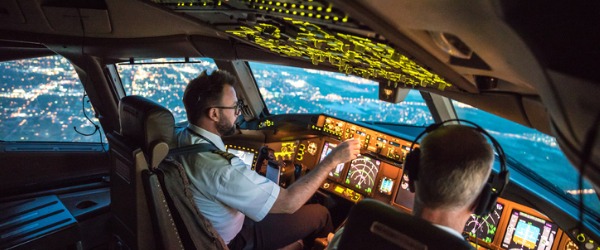What is a Pilot?
A pilot is someone who is in the aviation industry, and who is able to operate aircraft in order to transport passengers or goods from one location to another. They are employed by commercial airlines, corporations, or governments. In some cases, pilots are self-employed or work for an individual to provide private transport in small aircraft or private jets. Aviation is a diverse career field with many opportunities in both the public and private sectors and even opportunities to work in an educational setting.
What does a Pilot do?

Depending on what area of the industry the pilot works in, they may be responsible for transporting civilians, members of the military, private goods, commercial products, or other types of cargo. The type of aircraft used depends on the pilot's specialization. Some pilots fly helicopters while others fly larger commercial aircraft to transport tens or even hundreds of passengers. Other pilots fly cargo planes to move large amounts of mail, automobiles, industrial equipment and other goods from one area to another.
The most well-known pilots are those who work for an airline company, flying passengers who are commuting or vacationing. Their primary responsibility is to operate the aircraft, but their day consists of many hours performing other tasks. Pilots check the weather and confirm flight plans before departing. They also perform pre-flight inspections and check flight logs prior to departure. During the flight, pilots are responsible for the safety of all crew and passengers on board. They may often need to make split-second decisions and are in constant contact with the Federal Aviation Administration (FAA) to keep abreast of changes to the flight plan or safety issues. Commercial cargo pilots work in much the same capacity, with the only major change being that they transport cargo instead of people.
Careers are also available in the military, where pilots transport military personnel, soldiers, equipment, or goods for the government. Military pilots fly jets, bombers, and helicopters in combat, rescue, or reconnaissance missions. Some military officers are employed as test pilots, evaluating new and experimental aircraft prototypes.
In the private sector, pilots typically fly smaller planes like jets or light aircraft. They are employed by businessmen or celebrities and provide on-demand service for all their client's traveling needs. A private aviator may work as an independent contractor and offer service for-hire to many customers, or be employed solely by a corporation or wealthy individual.
Pilots with enough experience in the industry may eventually decide to work for or establish an aviation school. As an instructor in the school, pilots teach prospective aviators the fundamentals of flight. Topics covered in private lessons include safety, aviation history, and flying procedures. They work with students and enable them to obtain their private pilot certificate or instrument rating.
What is the workplace of a Pilot like?
Pilots rarely adhere to the standard 40-hour work week. Due to constant changes in airline itinerary and frequent shifts in schedules from weather and equipment malfunctions, pilots may work late at night, on weekends, and even on holidays. In the case of commercial airline pilots, FAA regulations require an eight-hour break between shifts which may result in overnight stays in distant cities or countries. Most pilots will fly between 75 and 80 hours per month. They are limited to a total of 100 hours per month, or 1000 hours in one year.
Pilots are also known as:
Airline Captain
Airline Pilot
Airline Transport Pilot
Commuter Pilot
Aircraft Pilot
Aviator